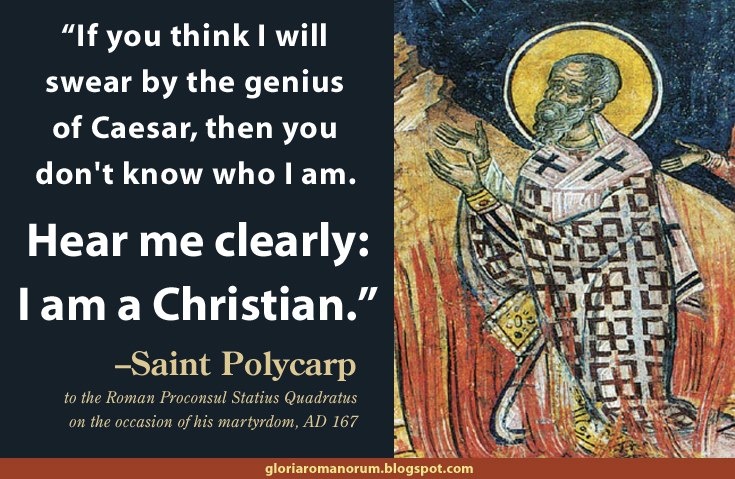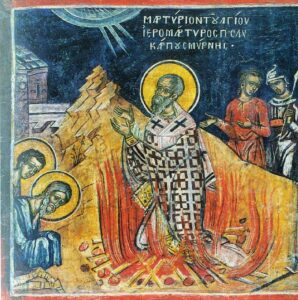
St. Polycarp was a bishop, martyr and Church father, and has the distinction of learning of the life of Christ directly from the Apostle St. John. Polycarp, a Greek name meaning “rich in fruit”, was born around the year 70 A.D. and as a child was converted to the Christian faith by St. John, the Apostle and Evangelist.
DISCIPLE OF AN APOSTLE
Polycarp became a disciple of St. John and much later in life he wrote with great devotion of his memories of sitting at John’s feet and hearing first-hand of the stories of the life of Christ. At the age of 26, Polycarp was consecrated Bishop of Smyrna, a city now known as Izmir on the Aegean coast of western Turkey. This happened soon before John was exiled to the Island of Patmos, so it is widely believed that it was John who consecrated Polycarp. A letter to Polycarp from St. John still exists, and was extensively read in the early Churches of western Asia. What we know about the life of Polycarp comes to us from several sources: the letters of the martyr Bishop St. Ignatius of Antioch, Polycarp’s letter to the Church at Philippi, the writings of the Church at Smyrna, and frequently in the writings of St. Irenaeus of Lyon. Irenaeus, in particular, was profoundly influenced by Polycarp and wrote vividly of his own instruction in the faith as a young student of this great bishop. Polycarp’s letter to Philippi is replete with quotations from the Gospels and Epistles. The Smyrneans recorded a compelling and trustworthy account of Polycarp’s arrest and martyrdom, and Ignatius wrote several of his epistles from the Church at Smyrna on the journey to his own martyrdom, and one of those epistles was addressed to Polycarp.
As a bishop, Polycarp was a powerful defender of true doctrine as taught by the Apostolic Fathers. He was a tireless opponent of the early heresies, especially Marcionism, which rejected the Hebrew Bible and was related to Gnosticism. He had a well-documented meeting with Pope Anicetus in Rome regarding setting a date for the celebration of Easter, where he was given permission to celebrate the great feast on a different day than at the Church at Rome.
CHOSEN FOR MARTYRDOM
During one of the waves of persecution of Christians, Polycarp was especially chosen for arrest because of his prominence and fearless preaching. The dates of this are disputed, but it was most likely during the fifth or sixth decade of the second century. Urged by friends to go into hiding, he took refuge in a farmhouse where he spent days and nights in prayer. During this time he had a vivid dream or vision of being surrounded by flames, whereby he knew that would be his fate. When he moved to another house, he was betrayed there by a servant who had been tortured and threatened with death. While he still had time to escape before the soldier’s arrival, Polycarp would not flee, but rather walked willingly to his arrest, invited his captors to dine with him, and was given from them several hours to pray. During his appearance before the proconsul, Polycarp was commanded to curse Jesus Christ, which he refused, despite being threatened with wild beasts.

He was condemned to be burned alive. While the bloodthirsty crowd gathered fuel for the fire, the bound saint could be heard thanking and praising God for counting him worthy of the grace of martyrdom. Rather than killing him, the flames miraculously vaulted around him, leaving him unharmed. Frustrated by this scene, the executioners stabbed Polycarp to death with a spear. The witnesses recorded seeing a dove come forth from the site of the wound, and the blood from the wound was so profuse, it put out the large fire around him. Afraid that his followers would be more of a nuisance to him with possession of Polycarp’s body, the proconsul ordered it burned. His followers, however, later took his bones as a memorial to his martyrdom. At the time of his death, Polycarp was recorded as being eighty-six years old.
St. Polycarp of Smyrna was the most important link between the Apostolic Fathers and the great Church Fathers who lived in the centuries after his life and death. His close connection with the Apostle John is undisputed, and his written account of what was taught by the Apostles, coupled with his opposition to the earliest heresies played a key role in the doctrinal formation of the early Church. His heroic willingness to suffer torture and death as a witness to Jesus Christ is a splendid example for us. St. Polycarp’s feast is celebrated worldwide February 23.
